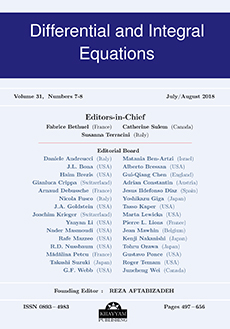Abstract
The aim of this paper is to investigate the well-posedness of the Cauchy problem $$ \begin{cases} \frac {\partial u}{\partial t} = \Delta u +V(x)u & \qquad \text {in }\mathbb R^N\times (0,T),\quad N\geq 3,\\ u(x,0) = u_0 (x), & \qquad \text {on }\mathbb R^N \end{cases} $$ where the potential $V$ is defined by $V=V(x):=\lambda/|x|^2$, $0\leq \lambda < (N-2)^2/4$. Roughly speaking, we prove that a sufficient condition for existence and uniqueness of the solution is to restrict the growths of the solution $u$ and of the initial datum $u_0$ as $ \vert x \vert \rightarrow \infty $ (at most like $e^{c|x|^2}$, with $c\in \mathbb R_+$) and near the origin (at most like $k|x|^\alpha$, with $k\in \mathbb R_+$, while $\alpha$ is a parameter depending on $\lambda$). For $\lambda >0$, the solution shall present a lack of regularity in the origin which is due only to the presence of the singular potential.
Citation
Claudio Marchi. "The Cauchy problem for the heat equation with a singular potential." Differential Integral Equations 16 (9) 1065 - 1081, 2003. https://doi.org/10.57262/die/1356060557
Information





